What Causes Dissociative Identity Disorder?
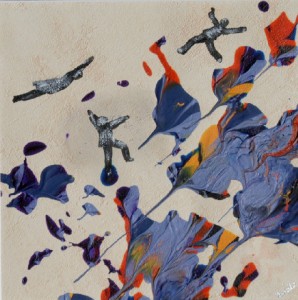 Usually life moves in small steps… sometimes life changes so completely, so suddenly, overnight, within a week, within a month… and who you were has no place in who you are now suddenly meant to be. But when you were does not die… it gets suppressed, left behind, shelved within your own world… still waiting for the continuity of its own life… as another you develops in accordance with the new situation, environment, expectations.
Usually life moves in small steps… sometimes life changes so completely, so suddenly, overnight, within a week, within a month… and who you were has no place in who you are now suddenly meant to be. But when you were does not die… it gets suppressed, left behind, shelved within your own world… still waiting for the continuity of its own life… as another you develops in accordance with the new situation, environment, expectations.
At 17 and already a ‘drunk’ since the age of 14, my mother had found herself pregnant with my older brother. My father, 7 years her senior, was still married though with no children. And so, in a time before abortion, before the pill, before single mother’s benefits, my mother faced his parents with the situation and she took over the place of his wife, moving in with them. My father was a compulsive womaniser and having new responsibilities did nothing to impinge on that. He violently defended his freedom, his sex addiction. Attempts to control him, to stop him, were met with attacks.
When my older brother was 9 months old, my mother, now 19 found herself pregnant again, with me. Symbiotically entangled with her first born, she couldn’t stand having another child impinge on their relationship. She attempted two home abortions with Quinine, both failing. According to my mother, whilst now heavily pregnant with me, she went to find my father and found him having sex with a 15 year old. According to her account, he responded to her claims upon him by threatening her with an axe. This was the relationship of my parents that I was born into.
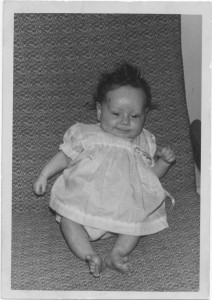 According to my father and paternal aunt I was severely neglected in my first six months as my mother attempted to enforce ‘letting me die’, an effort thwarted by my father, grandmother and this paternal aunt. The result was that I entered a welfare-run day program for ‘at risk’ children at 6 months of age to 2 and a half years old. At that time I was still in the body and we were not yet ‘multiple’. The purpose of the ‘at risk’ program was to give mothers a chance to learn the necessarily skills to take care of their ‘at risk’ child so the child would not end up in foster care. I went here from 9-5 Monday-Friday and was used to their routines, their smells, clothing, the building, the cots, the grounds, the voices of the uniformed ‘sisters’ who ran it. To me they were all ‘Sister Jelly’, like being a child in a Kibbutz.
According to my father and paternal aunt I was severely neglected in my first six months as my mother attempted to enforce ‘letting me die’, an effort thwarted by my father, grandmother and this paternal aunt. The result was that I entered a welfare-run day program for ‘at risk’ children at 6 months of age to 2 and a half years old. At that time I was still in the body and we were not yet ‘multiple’. The purpose of the ‘at risk’ program was to give mothers a chance to learn the necessarily skills to take care of their ‘at risk’ child so the child would not end up in foster care. I went here from 9-5 Monday-Friday and was used to their routines, their smells, clothing, the building, the cots, the grounds, the voices of the uniformed ‘sisters’ who ran it. To me they were all ‘Sister Jelly’, like being a child in a Kibbutz.
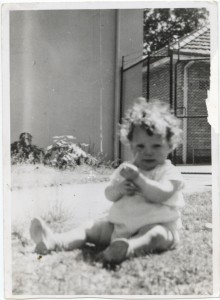
Then at two and a half years old, I suddenly lost this ‘home’, this ‘family’. Perhaps my mother was deemed to have ‘graduated’, been no longer considered a risk to my safety.
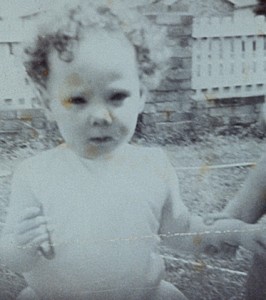
However, you can’t just suddenly negate or erase the first two years of a child’s life without it causing a ‘severing’ of their soul. A large chunk of my soul couldn’t cope with the new life and so left the body, the mind, the emotions. In time others would form in my absence, in total a team of 15 of them before the age of 5: Esby, Ning, Foosh, Opie, Polly, Willie, Carol, Rose, Da, Shirley, Addie, Bobby/Lee, Marnie, Katrina.
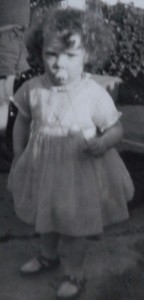 But life 9-5 Monday-Friday with my mother from the age of 2 was a million miles from being ‘safe’. When not being taken out all night by my father, not down the street at Mrs Cappellazzo’s, not in the park with my team’s ‘tree friends’, not with our paternal grandparents, ‘we’ were the imposition who got in the way of the ‘idealised’ symbiotic relationship between my older brother and my mother.
But life 9-5 Monday-Friday with my mother from the age of 2 was a million miles from being ‘safe’. When not being taken out all night by my father, not down the street at Mrs Cappellazzo’s, not in the park with my team’s ‘tree friends’, not with our paternal grandparents, ‘we’ were the imposition who got in the way of the ‘idealised’ symbiotic relationship between my older brother and my mother.
Particularly between the age of 2-3, many in my team had been terrorised and abused in the ways a resentful, substance abusing, personality disordered carer from a background of intergenerational incest might compulsively choose to play out. Some of my team remember being tied to my bed, shut in our bedroom, regularly being strapped until the body went into shock and we couldn’t breathe. Some remember being taught that the body was not ours, that we were a doll, that even crying could risk getting us killed and that at any time the other option was to throw us in a children’s home’. At night, some of our team experienced ongoing suffocation abuse (which damaged and later lost our respiratory drive). We were also told by an aunt who was made to give us Valium and gin in our bottle that we were being kept sedated.
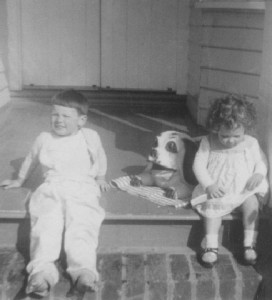
As a result we got diagnosed ‘psychotic’ at the age of 2 and a half in a 3 day inpatient hospital assessment in 1965 (when autism was deemed Infantile Psychosis) and at the age of 3 drowned twice due to having no respiratory drive to drive us to try and breathe. We survived brain injury related hypoventilation until adulthood when our respiratory drive failed fully and was traced back to the abuse that caused the related damage. Our mother was sectioned for a short time when we were 3 years old when she tried to shoot our father, but (by her own account) was released once she convinced the psychiatrist she had only been temporarily insane.
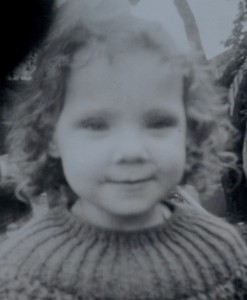
The part of our team known as Rose, had loved being in Mrs Cappellazzo’s house at the end of our street for as long as that part could remember. We learned from her in adulthood that we’d been left in our pram in her driveway since 6 mths of age so Rose had probably begun taking herself there when we were around 2-3 years old. Mrs Cappellazzo was jolly like our paternal grandmother, she sang and cooked and hand fed Rose from her cooking.
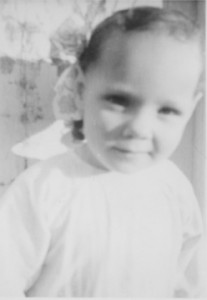 By 4 years old Rose had formed too much attachment to her and, not being her child (and possibly also now threatened by our biological mother resenting our attachment to yet more mother replacements), it was time to let us go. She began closing Rose outside and drawing the blinds on her. Rose couldn’t understand. Mrs Cappellazzo was crying. Rose had been a ‘real girl’ (as opposed to a doll) being now turned into a ‘stray’. Rose took to spending time in Mrs Cappellazzo’s garden as her eldest child, two years our senior, did his job to shoo us away, off their property, out of their family. Rose took to the park at the end of the street, where our tree friends lived, getting on the swing to see over Mrs Cappellazzo’s fence in glimpses. Rose watched their daughter, two years our younger, the girl she’d known as her sister, not remember her as she befriended her same age Italian neighbor and went to play together.
By 4 years old Rose had formed too much attachment to her and, not being her child (and possibly also now threatened by our biological mother resenting our attachment to yet more mother replacements), it was time to let us go. She began closing Rose outside and drawing the blinds on her. Rose couldn’t understand. Mrs Cappellazzo was crying. Rose had been a ‘real girl’ (as opposed to a doll) being now turned into a ‘stray’. Rose took to spending time in Mrs Cappellazzo’s garden as her eldest child, two years our senior, did his job to shoo us away, off their property, out of their family. Rose took to the park at the end of the street, where our tree friends lived, getting on the swing to see over Mrs Cappellazzo’s fence in glimpses. Rose watched their daughter, two years our younger, the girl she’d known as her sister, not remember her as she befriended her same age Italian neighbor and went to play together.
Around age 2-3 my father would take some of us – Polly, Carol, Da – out at nights in his car as he collected money (or sex) from buyers of his used cars. This also kept us safe from the person who had been dangerously sedating us, suffocating us, assaulting us. But then we were seen by the GP for suspected sexual abuse (it was in our medical records, the GP discussed the suspicion). A member of our team – Willie – remembered the abuse between ages 2-4 and knew who abused us and who endangered us to others and that this was not done by our father or grandfather nor with their awareness. But now with no justification, our mother banned our father from speaking to us, looking at us, picking us up. Again, the woman who was losing her ‘doll’ to other carers had thwarted the competition. This silly, crazy father who had ensured we’d lived, survived, who kept us engaged with the singing and dancing he got from his mother, and now he too was gone, turned into ‘nobody’, a mere visitor in the house. It was not until we were around 9 that he again made some of us dance, sang at us and became our comrade amidst daily abuse. He would sneak a compassionate look here, a pulled face behind our abuser’s back there. He kept us from complete madness where he could and when he couldn’t and we went selectively mute, stopped self feeding , then he fed us, with dignity, and equality, as a comrade, and never stopped seeing the person we were, the person we had always been, the person he saw even when we had been a baby.
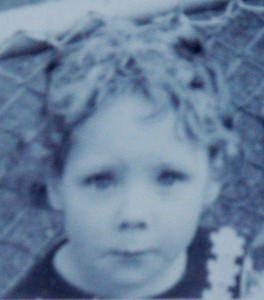 At 4 and a half my grandfather was suddenly dead in his bed. He and our grandmother were by now my team’s custodians and lived in the shed in the back yard. Their shed was our home – particularly for Polly. Each morning at dawn she’d go to them, get hand fed from their tins of biscuits and raisins, their cups of tea, be warm in their bed, hear music played by my singing, spoon playing, harmonica playing, squeezebox playing, smiling, dancing grandmother. She chased reflected light from a mirror aimed around the walls by our quiet, solitary, serious grandfather, watch him play with magnets and mercury balls, make puppet creatures from his handky. Spent time in the garden with them where they looked after chickens, grew veggies. And then he was purple, stiff, cold and carried away by the white coated ambulance people and our grandmother never came home again. She went to live 100 miles away at her daughter’s house. Polly went into grief and in her wake came Anne, in the dark of the empty shed, like a ghost, in grief, no counseling, no help. Then the chickens were killed off, the chicken shed pulled down for a rock garden, the veggie patch dead and derelict, their old shed devoid of any warmth, belonging, any home. Polly and Anne saw her only 4 more times, once a year, each time banned from crossing the room to her, only able to view her from the wall in the hallways.
At 4 and a half my grandfather was suddenly dead in his bed. He and our grandmother were by now my team’s custodians and lived in the shed in the back yard. Their shed was our home – particularly for Polly. Each morning at dawn she’d go to them, get hand fed from their tins of biscuits and raisins, their cups of tea, be warm in their bed, hear music played by my singing, spoon playing, harmonica playing, squeezebox playing, smiling, dancing grandmother. She chased reflected light from a mirror aimed around the walls by our quiet, solitary, serious grandfather, watch him play with magnets and mercury balls, make puppet creatures from his handky. Spent time in the garden with them where they looked after chickens, grew veggies. And then he was purple, stiff, cold and carried away by the white coated ambulance people and our grandmother never came home again. She went to live 100 miles away at her daughter’s house. Polly went into grief and in her wake came Anne, in the dark of the empty shed, like a ghost, in grief, no counseling, no help. Then the chickens were killed off, the chicken shed pulled down for a rock garden, the veggie patch dead and derelict, their old shed devoid of any warmth, belonging, any home. Polly and Anne saw her only 4 more times, once a year, each time banned from crossing the room to her, only able to view her from the wall in the hallways.
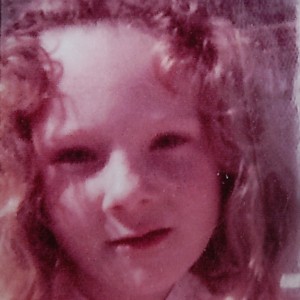
Unable to rise to the necessity of ‘acting normal’, Polly developed an alter named Carol. Carol accepted herself as a doll, modelled herself on television children, complied with dancing lessons, went to school and mirrored other children. Within two years of living as Carol, we had a baby brother. Smiley and giggly, he awoke emotion in Carol and made her more than a programmable doll. Then, no sooner was this new brother taking his first steps, we were moving house… away from all we’d ever known, away from the shed that had been our grandparents’ home. Away from Mrs Cappellazzo’s house. Away from the park we had made our home with our tree friends. Away from the simple weatherboard house in the quiet dead end street.
The new house was a two story, brick ‘mansion’ on a bustling main street. It was filled with endless spending and decadence, a built in swimming pool, convertibles and chandeliers, antiques and flocked wallpaper, gold leaf tiles and designer decor, dirty money, guns, sex parties and alcohol on tap. It was a hybrid between a home and a brothel, a place of excess without boundaries, a place where money was a magnet and strangers did whatever they liked and I was stroked and shown off and Carol was drilled with the mantra she was ‘so lucky’ until you could do almost anything to the’lucky girl’.
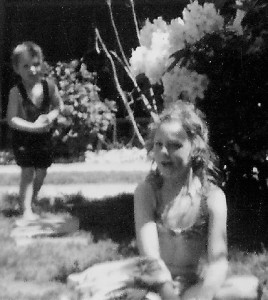 My team found another home around the corner when we were 8-10. We spent at least half the nights of the week sleeping there and became part of their Italian family. Addie spent time helping clean the house, watching the mother sew in her work-from-home shed where she did piece-work surrounded by buttons and cottons and fabric. Addie and Carol watched stray kittens be born and helped clean their eyes of cat flu. Rose and Carol danced and sang to Italian music and songs. Polly drank milky coffee with dipped bread. Then it ended, abruptly within a day and was all gone.
My team found another home around the corner when we were 8-10. We spent at least half the nights of the week sleeping there and became part of their Italian family. Addie spent time helping clean the house, watching the mother sew in her work-from-home shed where she did piece-work surrounded by buttons and cottons and fabric. Addie and Carol watched stray kittens be born and helped clean their eyes of cat flu. Rose and Carol danced and sang to Italian music and songs. Polly drank milky coffee with dipped bread. Then it ended, abruptly within a day and was all gone.
By the age of 12 the alcohol and pills that had been around us before my birth and all the years of our childhood offered part of my team – Marnie – the same route. Coming home to violence and degradation, our body would tremor at the front gate and soon we couldn’t bring myself to return.
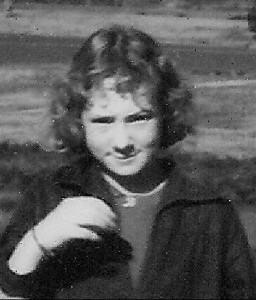
Instead we slept in a friend’s shed, walked around the streets, snoozed in laneways until woken by noises and bolting, at fruit from trees, ate scraps of left overs, had ‘our own’ abandoned house, got an unofficial foster family, and lived as a homeless until ‘graduating’ to ‘domestic prostitution’ at 15.
Then groomed, raped, bashed, intimidated and controlled, parts of our team – Addie, Carol, Marnie and Rose – became sex-on-call to the older men who had ‘charitably’ lived with us. Immersed in a world of dope heads and pill poppers, we had become the psych patient and took a lifeline, jumping ship into education.
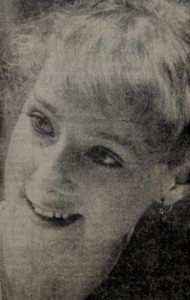 Within a year we went from illiterate, innumerate, unemployable, to educated and university ready. We didn’t take most of the alters along. Most of this new world was designed for a different life/lives. Most of it just didn’t fit this new world, had never been oriented in this direction. Nevertheless, what was on offer was a life with a far different future to the one the team had had.
Within a year we went from illiterate, innumerate, unemployable, to educated and university ready. We didn’t take most of the alters along. Most of this new world was designed for a different life/lives. Most of it just didn’t fit this new world, had never been oriented in this direction. Nevertheless, what was on offer was a life with a far different future to the one the team had had.
After four years in which – Mostly Willie – was a university student we emerged educated and as dissociated as we ever were and found ourselves leaving Australia, on a plane to the UK. Within months we were itinerant and went to Germany, then to London and when about to step in front of a train in the London Underground, we instead determined that we couldn’t get ‘out of here’ until we had typed out our life/lives and allowed one person in the world to actually know the big picture.
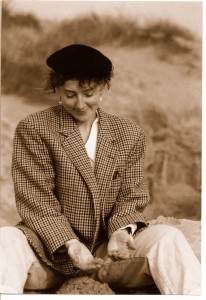 There was no intention of ever being famous. The book was written in 4 weeks and was left behind in the UK where it got passed around until it ended up with a publisher who passed it to an agent who contacted us back in Australia informing us he had four publishers bidding for the rights to publish it. Within a year we were a best selling author, endless interviews, travel, hotels, then conferences. Virtually no part of us had any background to prepare for anything like this. It was odd, alienating, dizzying, but still it was a safer life than so many of the lives we’d already had so though this new life didn’t fit us, some of us learned to fit it.
There was no intention of ever being famous. The book was written in 4 weeks and was left behind in the UK where it got passed around until it ended up with a publisher who passed it to an agent who contacted us back in Australia informing us he had four publishers bidding for the rights to publish it. Within a year we were a best selling author, endless interviews, travel, hotels, then conferences. Virtually no part of us had any background to prepare for anything like this. It was odd, alienating, dizzying, but still it was a safer life than so many of the lives we’d already had so though this new life didn’t fit us, some of us learned to fit it.
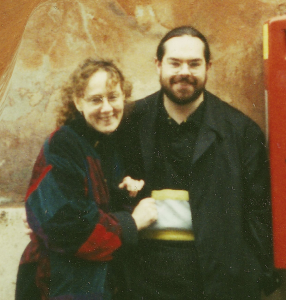 We were intermittently in treatment for PTSD from 1997-2001 and married Chris in 2000 and he was soon aware he was married to an array of different Donnas… the quiet, shy, reclusive one he’d later know was Anne, the gentle, kind hearted listener he’d later know was Addie, Polly and her playful snuggly 3 year old style antics, Willie and his intense responsibility, fixations, and logic, Da and his Jim-Carey style living circus bipolar ways, Rose’s sexuality and treatment of him as her Italian boyfriend (he’s Welsh with some Italian heritage), even Ning (who only talks in ‘cat’), but others, like Esby, Shirley, Katrina, Marnie, Lee emerged so seldomly when he was around that he never got to know them with much depth until ten years later. Chris was the first friend, family member or partner who ever knew or accepted the entire team without cherry picking. He ultimately found ways of connecting with every one of us and this allowed us all to progressively imagine that in spite of our differences, we might all find some sense of home in the one place, with this one person.
We were intermittently in treatment for PTSD from 1997-2001 and married Chris in 2000 and he was soon aware he was married to an array of different Donnas… the quiet, shy, reclusive one he’d later know was Anne, the gentle, kind hearted listener he’d later know was Addie, Polly and her playful snuggly 3 year old style antics, Willie and his intense responsibility, fixations, and logic, Da and his Jim-Carey style living circus bipolar ways, Rose’s sexuality and treatment of him as her Italian boyfriend (he’s Welsh with some Italian heritage), even Ning (who only talks in ‘cat’), but others, like Esby, Shirley, Katrina, Marnie, Lee emerged so seldomly when he was around that he never got to know them with much depth until ten years later. Chris was the first friend, family member or partner who ever knew or accepted the entire team without cherry picking. He ultimately found ways of connecting with every one of us and this allowed us all to progressively imagine that in spite of our differences, we might all find some sense of home in the one place, with this one person.
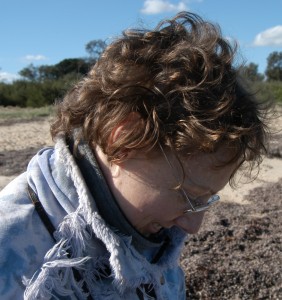 In 2010 we were diagnosed with Dissociative Identity Disorder. We had already had written about a few of the Donnas that were in our team but it was one of our hosts, Willie, who told our therapist about most of them and in describing me said I was a rather insignificant alter, had barely ever been in the body, more like a ghost who just inhabited the body to do the typing, channeling everyone else in the team. By October 2010 I had begun to cry and shake as I was typing, channeling all these other people who went by the name ‘Donna’ (but who largely also had their own names and didn’t have any attachment to the name Donna). Then I realised I was not a ghost. I was not in fact an alter at all, nor insignificant. I was the Core Self, the original self, and had been ‘asleep’… for years… since the age of 2… and now we were 47.
In 2010 we were diagnosed with Dissociative Identity Disorder. We had already had written about a few of the Donnas that were in our team but it was one of our hosts, Willie, who told our therapist about most of them and in describing me said I was a rather insignificant alter, had barely ever been in the body, more like a ghost who just inhabited the body to do the typing, channeling everyone else in the team. By October 2010 I had begun to cry and shake as I was typing, channeling all these other people who went by the name ‘Donna’ (but who largely also had their own names and didn’t have any attachment to the name Donna). Then I realised I was not a ghost. I was not in fact an alter at all, nor insignificant. I was the Core Self, the original self, and had been ‘asleep’… for years… since the age of 2… and now we were 47.
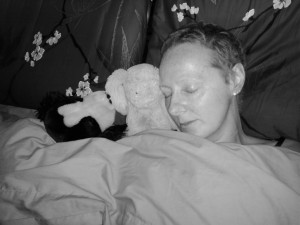 I wondered if I’d come back into the body because perhaps we were dying, that something was terribly wrong. Within a year we were dealing with breast cancer, going through mastectomy and chemo and dealing with failed respiratory drive and associated central apnea which could kill me just by falling asleep without mechanical ventilation.
I wondered if I’d come back into the body because perhaps we were dying, that something was terribly wrong. Within a year we were dealing with breast cancer, going through mastectomy and chemo and dealing with failed respiratory drive and associated central apnea which could kill me just by falling asleep without mechanical ventilation.
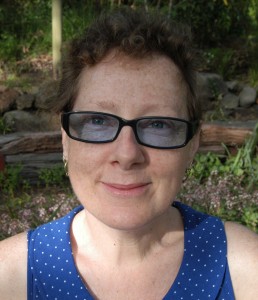 My return to the body pulled the team together. They had an internal counsellor, a negotiator, a house parent who had no vested interest in any one direction on account of having been absent most of my own life. Finally someone was in charge who would listen to and respectfully acknowledge all of their identities, attachments, interests and negotiate all of their concerns and needs.
My return to the body pulled the team together. They had an internal counsellor, a negotiator, a house parent who had no vested interest in any one direction on account of having been absent most of my own life. Finally someone was in charge who would listen to and respectfully acknowledge all of their identities, attachments, interests and negotiate all of their concerns and needs.
By 2015, with three years of mechanical ventilation consistently giving us adequate oxygen for the first time since age 2-3, I had gone from being co-conscious with each of them to them being co-conscious with each other and them now experiencing me co-consciously. Our one physical brain was connecting up the compartmentalised identities, memories, functions. Finally, as ‘their memories’ no longer surprised me, confounded me, sometimes shocked me, I began to experience the repetition of ‘their memories’ as ‘mine’ by proxy, then as ‘mine’ from some altered states of consciousness, and soon just ‘mine when I used to be Willie, or Rose, or Marnie, or, or, or. And so I realised we had reached semi integration on the road to integration. I would likely never be a singleton and always be a multiple. But I would probably be a more integrated one.
Sure, I experienced severe trauma, loss, neglect but I don’t think this alone caused my multiplicity. Dissociative Identity Disorder is both a Dissociative Disorder and an Identity Disorder. Whilst the trauma, loss and neglect all caused a heightening of dissociation, I think there were other things that would have caused me to develop multiple identities anyway. My view is that the inability of my biological mother meant that in the crucial age in which identity is forming, up to 4 years old, I was mothered by a series of other people, each with their own distinct environments, cultures, relationships to me. Out of this came naturally developing multiple identities. I also think that some people are more predisposed to the ‘skill’ of dissociation, of compartmentalisation on a personality level but also neurologically. Brain connectivity is important in the cohesion of sensory and cognitive experiences, in multitasking and associated joint awareness. Certain conditions interfere with brain connectivity. Fetal Alcohol Spectrum Disorder is one of these, collagen disorders may be another (collagen is involved in brain connectivity), both of which could have left me with altered brain connectivity even before dissociation and identity even figured.
My father was likely multiple and I can identify so many different ‘Jacks’: Sparkling Arkie, Jackie Williams, Wild Dog Dingo, Poor Boy… He was father to some of my team: Da, Carol, Polly, Addie, but felt more like an uncle to others, like Shirley, Lee, Marnie, and Anne, and felt like ‘just someone in the house’ to others like Rose, Katrina, Esby and Willie.
My mother’s substance abuse made her at least two people. Her childhood at poor, uneducated underclass who married into a life among suburban middle and respectable working class communities surely put her at odds with her own roots, and even the materialism and decadence of the years of dirty money and all that went with it would have been completely at odds with the background of relatively poverty she so staunchly identified with. Being torn between the facades of what she wished to be and the glaring damage caused by what she actually was would also have left her compartmentalised. She was ‘almost mother’ to Shirley, train wreck dependent to Addie, stage mother to Carol, but to the rest of my team she was our prison warder, our abuser, the person we were trapped with, our stalker, someone we felt sorry for or responsible for. For me, there is no attachment, never has been.
Our older brother had been brother to Carol and a ‘stranger in the same house’ to others, tormentor to others. Some had as much compassion for him as they’d have had for any stranger. But even that wore out its welcome.
Our younger brother had been brother to Carol, to Da, to Addie and eventually for a time also ‘adopted’ brother to Rose. But to the rest of the team he was ‘just someone else in the house’, part of a life or new life that was disconnected to their own.
It is challenging to be multiple in a singleton world. They are different ‘languages’. So much doesn’t directly ‘translate’. To some degree, most people have some level of multiplicity. So it is imaginable to them. For others it is still something ‘freaky’, ‘broken’, ‘alien’ that should be kept in the closet. I was what I was. I am what I am. Waiting to be easily comprehensible is probably futile. Living life out of the closet is a life I’m less likely to regret.
Donna Williams, BA Hons, Dip Ed.
Author, artist,and presenter.
http://www.donnawilliams.net
I acknowledge Aboriginal and Torres Strait Islander people as the Traditional Owners of this country throughout Australia, and their connection to land and community.

…you are one beautiful and strong human being Donna..
…you are one beautiful and strong human being Donna..